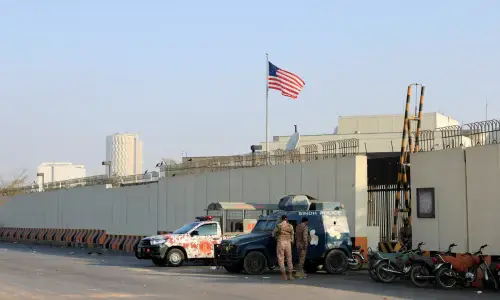I MUST have flown from Colombo to Karachi at least 20 times over the last several years, and normally, it takes just a bit over three hours.
But last week, it took me a shattering 12-hour all-nighter to get to Karachi via Doha. Why Doha? You may well ask as Qatar’s capital is way to the west, and the last place you would think of changing planes on a flight to Karachi. The reason is that India has closed its airspace, forcing planes from the east to make a huge detour.
In the scheme of things, my inconvenience would not count for very much. But when you multiply it by the thousands of passengers and hundreds of aircraft that have had to skirt around Indian airspace ever since the Indian air attack at Balakot, and the aerial skirmishes over Kashmir, the costs add up.
Not to be outdone in this childish game of tit-for-tat, Pakistan has also closed its airspace to foreign flights, forcing them to Europe to adopt a circuitous (and expensive) route. Having observed the one-step-forward, two-steps-back dance performed over the years by these two South Asian rivals for years, I can only say that they seem to be stumbling a lot more.
Over time, the peace lobby has become weaker.
Just as the rhetoric from Pakistan appears to have become a little more mature, the hysterical warmongering in India seems to have become shriller. One reason for the relatively peaceful sounds emanating from Pakistan is the realisation that the economy cannot sustain hostilities with our much bigger neighbour for long. And nor can we use our nuclear weapons without risking mutually assured destruction together with India.
International pressure to rein in the extremist groups that infest the country is steadily growing, with the threat of the Financial Action Task Force black list looming ahead. Without diplomatic support for its Kashmir stance, Pakistan can do little but lodge protests against Indian atrocities in the Indian-occupied Valley. The world is heartily sick and tired of the problem, and just wishes it would somehow go away; and it would, but for the heroism of the Kashmiri people.
Ask most Pakistanis how the conflict can be resolved, and they will reply that the UN resolution should be implemented, and a plebiscite held to ascertain the will of the Kashmiris. But 70 years after the UN took up the matter, the world has moved on. Foreigners, even well-informed ones, simply don’t understand why the two countries cannot sit down and sort out the problem instead of clashing repeatedly over it.
Thus, all these years of banging on about a plebiscite has cut no ice with either India or the international community. Another obstacle is the fact that at the 1972 Shimla conference, Zulfikar Ali Bhutto agreed that outstanding problems would be sorted out bilaterally. This was the price he had to pay for the release of 90,000 Pakistani prisoners of war captured in East Pakistan.
As India’s position has hardened, the prospect of a negotiated settlement is further away than ever. With Modi’s Hindutva supporters baying for blood, it is hard to see how any Indian government will find the backbone to resolve the issue. Indeed, over time, the peace lobby has become weaker.
Many Pakistanis, Imran Khan included, imagine that a Congress government — if elected in next month’s general elections — will be more amenable to a peaceful settlement. But given the hype and hysteria we witnessed recently following the Indian raid at Balakot, this is grasping at straws.
We should also recognise that Pakistan had previously played into the hands of extremists on both sides of the divide by giving terrorists a platform from which to launch cross-border operations. In Pakistan, these jihadists have gained legitimacy and recruits; in India, their bloody attacks have provoked a strong backlash. Now, these groups are at the top of the Indian agenda for any talks with Pakistan.
Seen from abroad, the fact that even after a decade, Pakistan has been unwilling to try and sentence the planners and organisers accused of orchestrating the horrifying Mumbai attacks in 2008 is mystifying. And it seems the crackdown on militant outfits like the Jaish-e-Mohammad and Lashkar-e-Taiba is aimed at pleasing the many critics of our policies.
There seems to be no serious effort to implement the agreed points contained in the National Action Plan hammered out over four years ago to combat terrorism. Other countries, faced with a far less deadly terrorist threat, have changed their laws and strengthened their law and order agencies. Meanwhile, we remain locked in our cycle of indecision and incompetence.
And as the two countries wrangle, poverty, illiteracy and hunger take their toll on our subcontinent, with around 1.5 billion people in both countries being made to pay the price for the callousness and stupidity of their leaders.
Published in Dawn, March 23rd, 2019





























